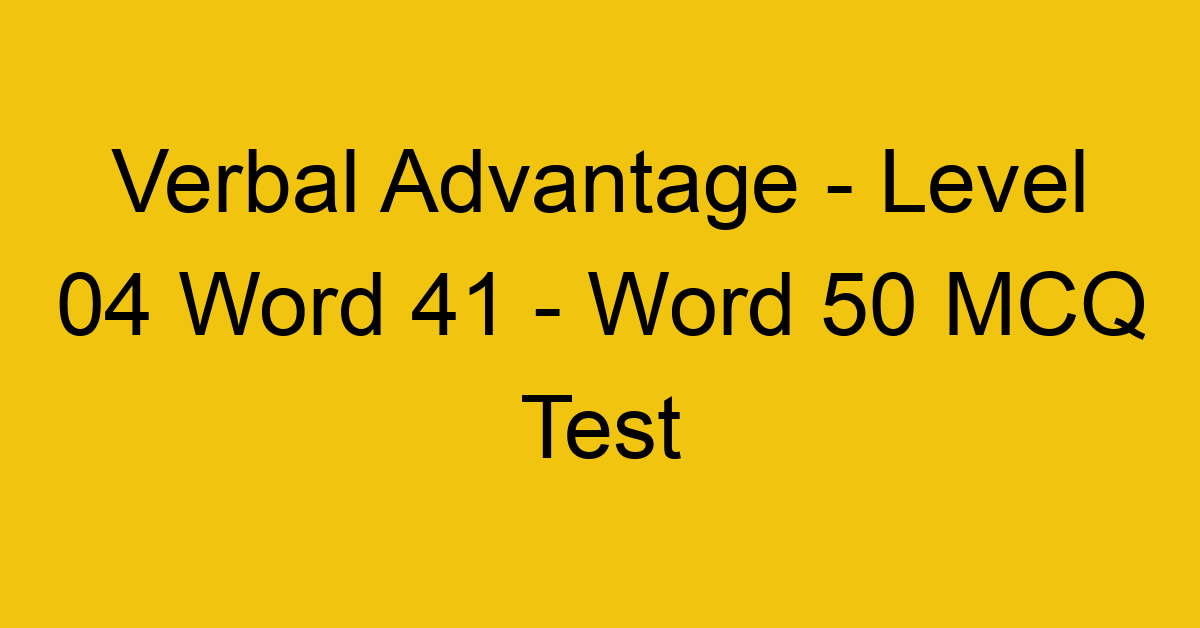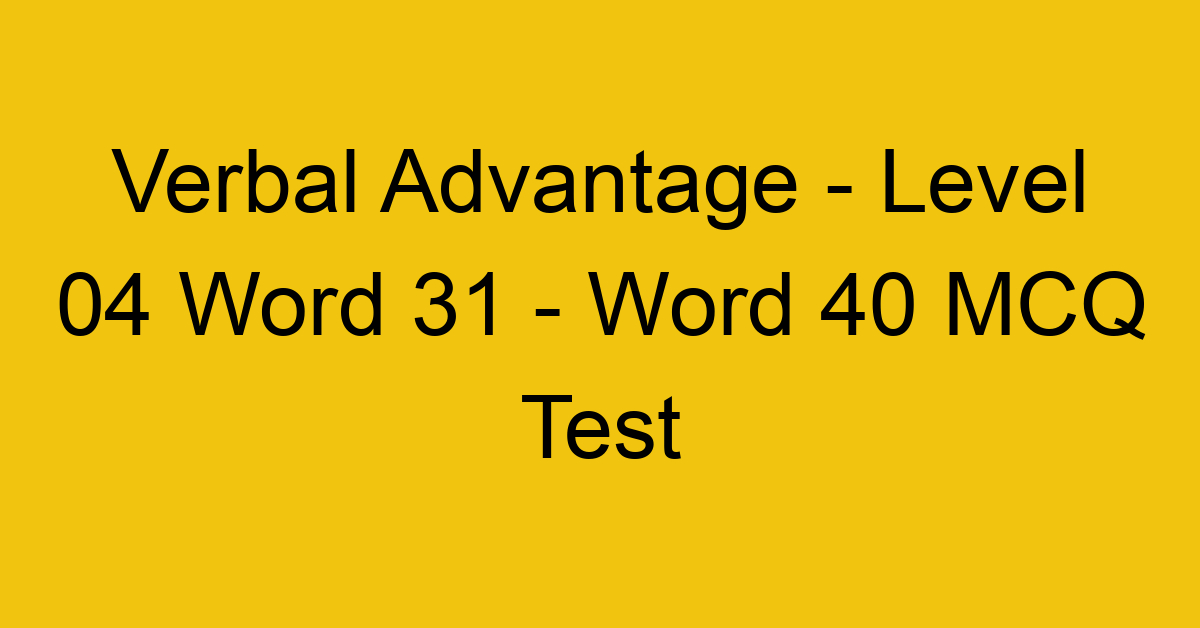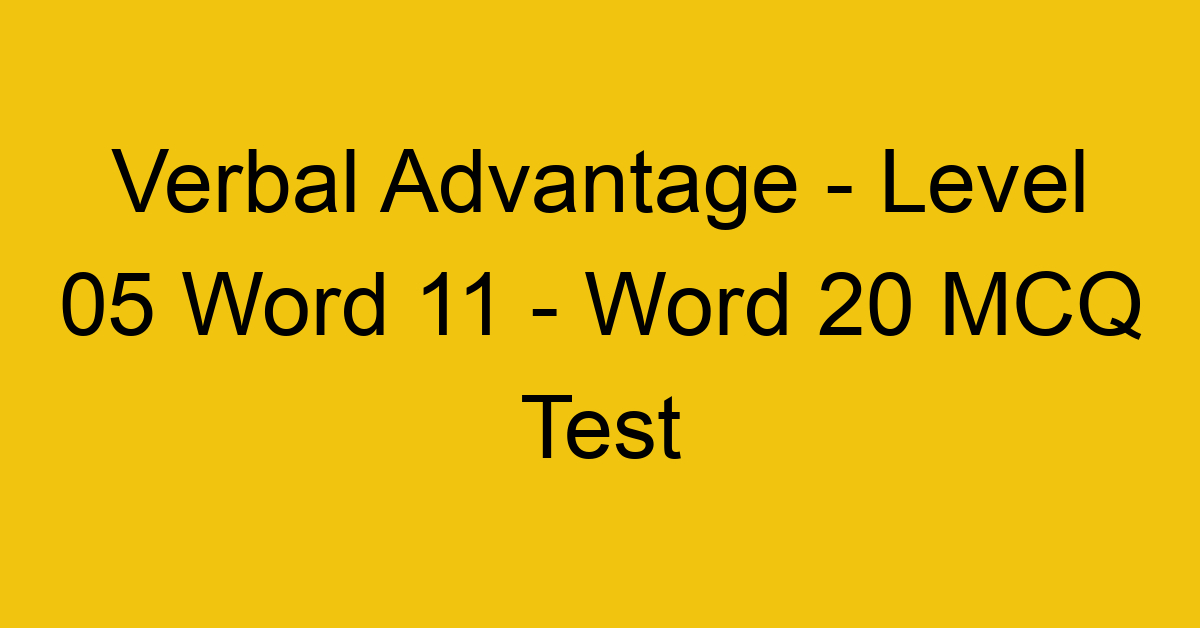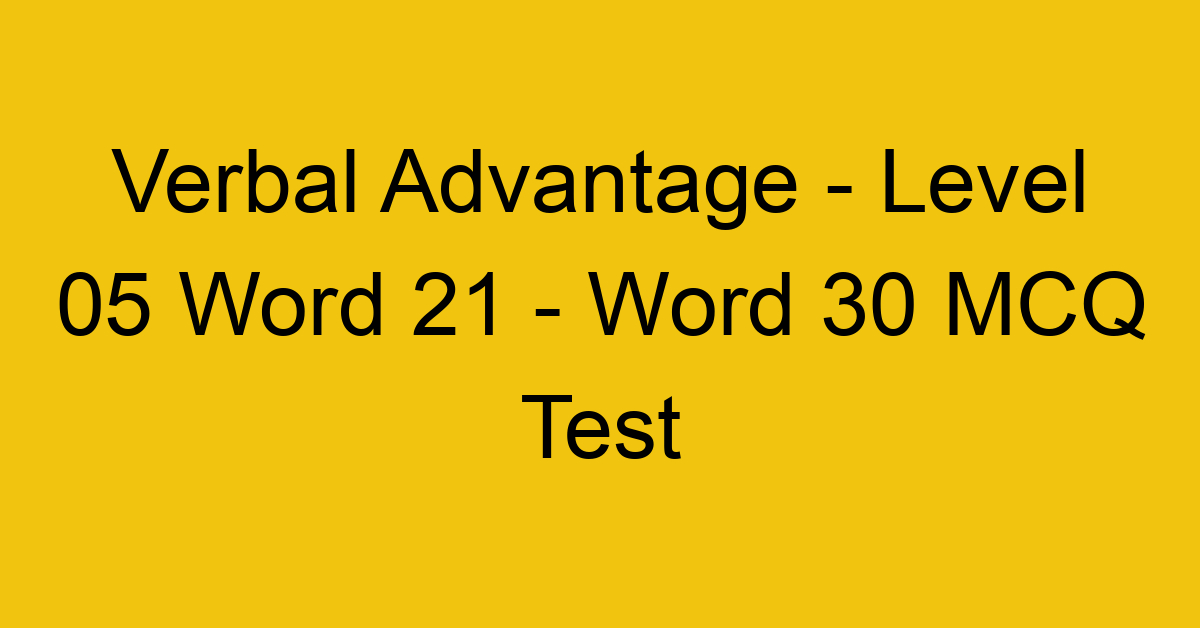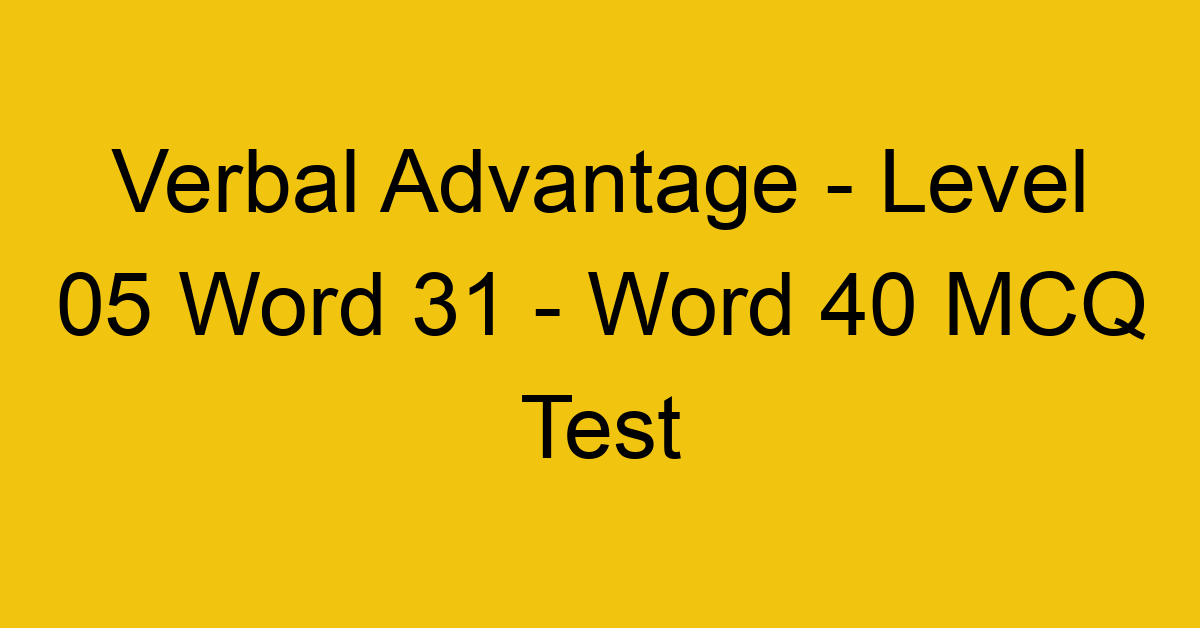Verbal Advantage - Level 05 Word 1 - Word 10 MCQ Test
Word List
- Word 1: Voluble [VAHL-yuh-bul]
Talkative, talking much and easily, characterized by a great and continuous flow of words.
→
Synonyms of voluble include long-winded, glib (word 8 of Level 3), garrulous (GAR-uh-lus), loquacious (loh-KWAY-shus), verbose (word 30 of Level 2), and effusive (e-FYOO-siv).
Antonyms include reticent, terse (word 3 of Level 3), laconic (word 18 of Level 3), and taciturn (TAS-i-turn).
Voluble refers to a person who talks freely and easily, and usually at great length. It may also mean characterized by a great and continuous flow of words; in this sense either speech or writing may be voluble.
- Word 2: Commiserate [kuh-MIZ-uh-rayt]
To sympathize, feel or express sympathy, show sorrow or pity for.
→
A somewhat unusual synonym of commiserate is the verb to condole (kun-DOHL), which means to grieve in sympathy, express condolence.
To commiserate comes from a Latin verb meaning to pity, and by derivation commiserate means to share someone else’s misery. Commiserate is often followed by with: “When Sally lost her job, her coworkers commiserated with her.”
- Word 3: Dilemma [di-LEM-uh]
A predicament. In general, any difficult problem or unpleasant situation; specifically, a predicament in which one must choose between equally undesirable alternatives.
→
As I mentioned in my discussion of quandary (keyword 27 of Level 3), dilemma is often used today of any difficult problem or troublesome situation, but many good writers and speakers object to that as loose usage.
Dilemma comes from the Greek di-, meaning two, and lemma, a proposition, and by derivation means a choice between two propositions. Strictly speaking, dilemma should be used only of situations in which one faces a choice between equally undesirable alternatives: Elected officials often face the dilemma of either voting for what their constituents want and going against their conscience, or voting their conscience and losing the support of their constituents.
Quandary (KWAHN-duh-ree), quagmire (KWAG-myr, rhymes with bag liar), and dilemma all refer to complicated and perplexing situations from which it is hard to disentangle oneself.
Quandary emphasizes confusion and uncertainty; someone in a quandary has no idea what to do to get out of it.
Quagmire emphasizes hopelessness and impossibility. Literally, a quagmire is a bog, a tract of soft, wet ground. When used in a figurative sense, quagmire refers to an inextricable difficulty. Someone in a quagmire feels hopelessly stuck and unable to get out.
By derivation, a dilemma is a choice between two equally undesirable, unfavorable, or disagreeable propositions. Hamlet’s famous dilemma was “to be or not to be.”
Colloquial or informal expressions for the state of being in a dilemma include “in a fix,” “in a pickle,” “between a rock and a hard place,” and “between the devil and the deep blue sea.”
- Word 4: Transitory [TRAN-si-TOR-ee or TRAN-ziTOR-ee]
Passing, temporary, fleeting, not permanent or enduring.
→
The words transitory, transient, ephemeral, and evanescent all mean passing, temporary.
Evanescent (EV-uh-NES-int) comes from the Latin verb evanescere, to vanish, disappear, and refers to something that appears briefly and then fades quickly away: evanescent memories, evanescent joy.
Ephemeral (e-FEM-uh-rul) means literally lasting only a day, but in a broad sense it refers to anything conspicuously short-lived: Our precious youth is ephemeral—lasting, it would seem, but a day. (Did you remember that short-lived is properly pronounced so that -lived rhymes with strived?)
Transient (TRAN-shint, not TRAN-zee-int) refers to anything that lasts or stays only for a short while: a transient occupant, a transient event.
Transient and our keyword transitory both come from the Latin transire, to go or pass over, the source also of the familiar words transit and transition. Transitory refers to something that by nature must pass or come to an end: Life is transitory, and sometimes so is love.
- Word 5: Philanthropic [FIL-un-THRAHP-ik]
Charitable, benevolent, humane; motivated by or done out of a desire to help or improve the welfare of others.
→
The corresponding noun philanthropy means a desire to help others, especially through charitable giving.
Philanthropy and philanthropic both come from the Greek philein, to love, and anthropos, man. Philanthropy means literally “love of mankind”; the adjective philanthropic means literally “loving mankind.”
You can see the Greek philein, to love, in such words as philosophy, literally love of wisdom; and philharmonic, literally loving or devoted to music. You can see the Greek anthropos, man, in anthropology, the study of mankind, of human customs, habits, and traditions; and anthropomorphic (AN-throh-puh-MOR-fik), shaped like or resembling a man or human being.
The words philanthropic, humanitarian, altruistic (AL-troo-IST-ik), and charitable all mean helping others. Charitable refers specifically to giving money to help others. Altruistic suggests unselfish giving. Humanitarian applies to persons or organizations devoted to reducing the pain and suffering of others. Philanthropic literally means motivated by a desire to help others; today the word is used chiefly of persons or organizations that make large charitable gifts, fund endowments, or finance humanitarian or cultural institutions.
- Word 6: Lethargy [LETH-ur-jee]
Lack of energy, sluggishness, dullness, apathy, stupor; an abnormally dull, drowsy, inactive condition or state of mind.
→
The corresponding adjective is lethargic, which means sluggish, drowsy, dull, apathetic: “Dan always felt lethargic after a big business lunch”; “Whenever we visit the zoo, the bears and the lions seem lethargic”; “Weeks after getting over the flu, Emily still felt lethargic.”
According to the third edition of The American Heritage Dictionary (1992), lethargy “may be caused by factors such as illness, fatigue, or overwork, but it manifests itself in drowsy dullness or apathy.”
Apathy (AP-uh-thee) and lethargy are close in meaning. Apathy suggests an indifferent state of mind, a thorough lack of emotion or concern: “Analysts predict that voter apathy will result in a low turnout for the election.” Lethargy is a prolonged state of dullness, inactivity, or lack of energy, a sluggish condition either of body or of mind: “The Renaissance roused Europe from the intellectual lethargy of the Middle Ages”; “As every college professor knows, nothing can penetrate or cure the lethargy of the college student who has partied too hard the night before.”
More difficult synonyms of lethargy include torpor (TOR-pur), somnolence (SAHM-nuh-lints), lassitude (LAS-i-t(y)ood), languor (LANG-gur), and stupefaction (ST(Y)OO-puh-FAK-shin).
- Word 7: Exonerate [eg-ZAHN-ur-ayt]
To free from blame, free from a charge or the imputation of guilt, declare blameless or innocent.
→
Synonyms of exonerate include acquit, absolve, and exculpate (ek-SKUHL-payt or EK-skul-payt).
Exculpate comes from the Latin ex-, meaning “out,” and culpa, blame, and means literally to free from blame. The word onerous (AHN-ur-us, like honor us, not OH-nur-us) means burdensome, and the corresponding noun an onus (OH-nus) means a burden. Exonerate combines the Latin ex-, out, with onus, a burden, to mean removing a burden—in modern usage, removing the burden of guilt.
- Word 8: Pugnacious [puhg-NAY-shus]
Given to fighting, combative (kum-BAT-iv), quarrelsome, ready and willing to fight.
→
Challenging synonyms of pugnacious include contentious (kunTEN-shus), belligerent (buh-LIJ-ur-int), and bellicose (BEL-i-kohs). Antonyms include peaceable, clement (KLEM-int, word 43 of Level 2), and amicable (AM-i-kuh-bul).
Pugnacious comes from the Latin pugnare, to box, fight with the fists, and still has the connotation of someone ready to put up his dukes. From the same Latin pugnare, to fight, we inherit the word pugilist (PYOO-ji-list), a boxer, someone who fights with his fists.
- Word 9: Contrition [kun-TRISH-in]
Remorse, penitence, repentance, deep and devastating sorrow for one’s sins or for something one has done wrong.
→
Penitence is sorrow for having sinned or done wrong; it is often temporary. The penitent person may say “I’m sorry” today and sin again tomorrow.
Remorse is deep sorrow. The remorseful person is tortured by a sense of guilt, and wishes he could erase what he has done.
Contrition is even more intense than remorse. It comes from a Latin verb meaning to crush, and by derivation means a crushing sense of guilt accompanied by a sincere, earnest desire to repent, make amends, and change for the better.
Contrition is the noun; the corresponding adjective is contrite (kun-TRYT, rhymes with a light), remorseful, penitent, full of guilt, regret, and sorrow for one’s sins or offenses: “When Larry’s wife found out about his mistress and his sleazy real estate deals and threatened to leave him, Larry was contrite and swore he’d mend his ways.”
- Word 10: Abrogate [AB-ruh-gayt]
To abolish by legal or authoritative action or decree.
→
Synonyms of abrogate include cancel, revoke, repeal, annul, nullify, and rescind (ri-SIND, word 31 of Level 3).
To abolish means to do away with: to abolish slavery, abolish cruel and unusual punishment.
Rescind, revoke, and repeal all suggest a formal withdrawal. Rescind means literally to cut off: you rescind an order. Revoke means literally to call back: you revoke a contract. To repeal means literally to call back on appeal, and applies to something canceled that formerly was approved: we repeal a law or an amendment.
To annul (uh-NUHL) and to abrogate mean to cancel or make void. A marriage may be annulled. Rights and privileges are abrogated, abolished by authoritative action or decree.


